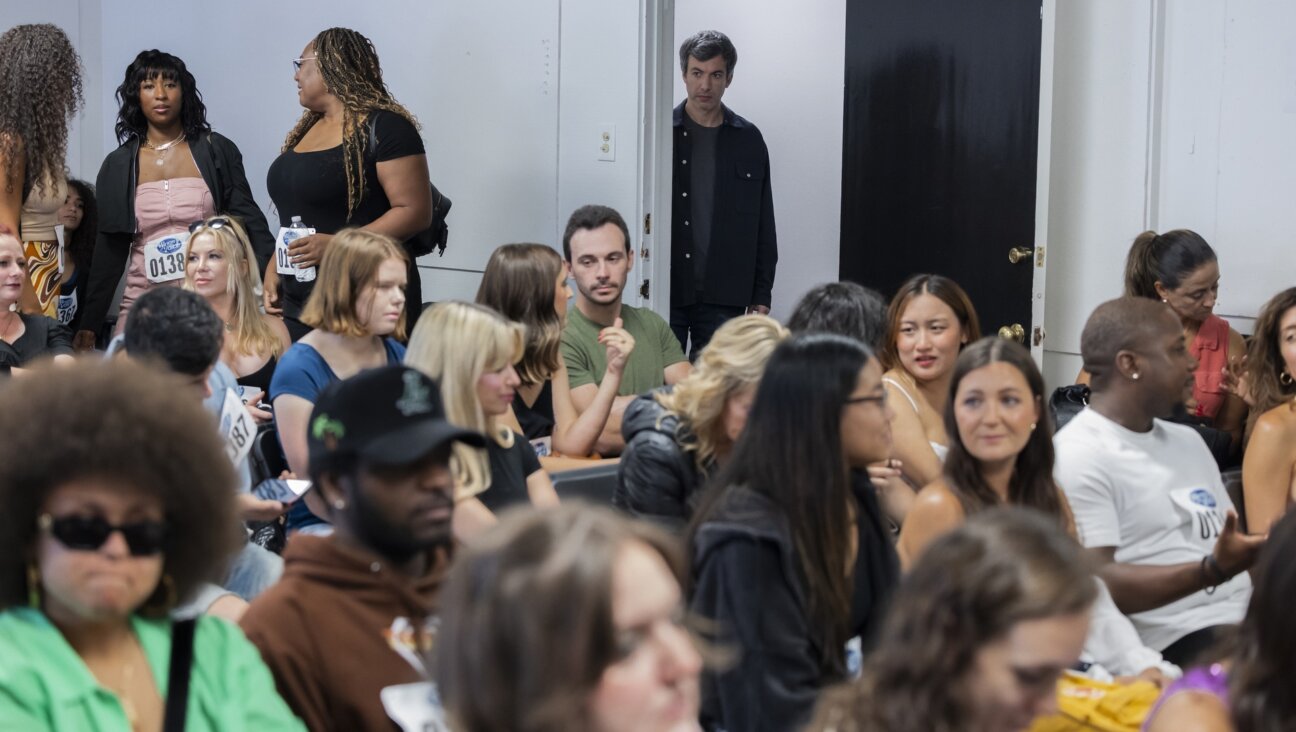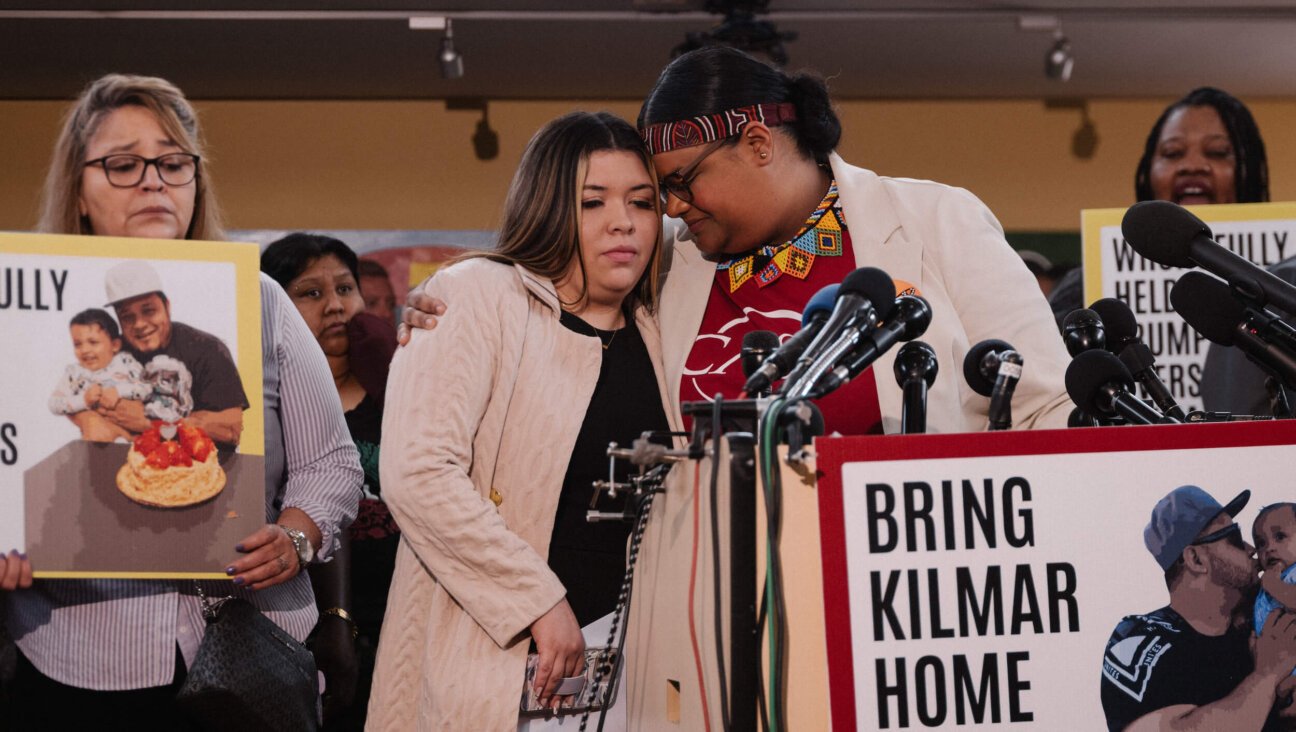GOP Leader Calls For Revisions to Fatah Movement’s Outdated Charter
Washington – A push by right-wing American Jewish activists to change the constitution of the governing Palestinian party is gaining momentum in Congress, even as Israelis are dismissing the document as “irrelevant,” and the umbrella body of American Jewish organizations has voted against taking up the issue.
Recent demands by the Zionist Organization of America for the rescinding of clauses in the Fatah party’s constitution calling for Israel’s destruction were rebuffed last week by the Conference of Presidents of Major American Jewish Organizations, which tabled a resolution on the constitution for at least the next three months. But the campaign has found a far more sympathetic ear in the House of Representatives, where leading lawmakers are calling for altering the 40-year-old document, and in the Senate, which is expected to raise the issue soon.
As the ZOA-led effort gathers momentum, Fatah members, Middle East experts and even Israeli officials are arguing that the campaign is a misguided distraction from the recently revived Israeli-Palestinian peace process, since the document no longer holds any significance and doesn’t serve as the party’s platform.
“If it was such an important document, someone would be able to get hold of an authoritative copy of it,” said Nathan Brown, director of George Washington University’s Institute for Middle East Studies and a leading scholar on Palestinian politics. “The governing documents regarding any ideological issue come from the PLO and the Palestinian Authority, not from the Fatah party.”
The long-forgotten Fatah document, which dates from the 1960s, came back to the attention of American Jewish officials almost by chance. Morton Klein, president of the ZOA, heard about it from a Druze lawmaker during a visit to Israel several months ago.
Klein searched for the Fatah constitution on Google, the online search engine, and found several Web sites containing translations of the document. The translations contained explicit calls for the destruction of the State of Israel, the eradication of Zionism and the continuation of armed struggle against Israel.
Klein raised the issue in July with Israeli opposition leader Benjamin Netanyahu, who, according to the ZOA president, promised to act upon it but has yet speak out publicly on the issue. In Washington, however, Klein’s efforts paid off last month with a resolution in the House, co-sponsored by Republican whip Roy Blunt, urging Palestinian Authority President and Fatah leader Mahmoud Abbas “to officially abrogate the 10 articles in the Fatah constitution that call for Israel’s destruction and terrorism against Israel.”
Klein also introduced to the Presidents Conference, days before the Annapolis, Md., peace summit, a resolution calling for changing the Fatah constitution. While the resolution initially gained written endorsements from 30 Jewish groups, support began to fade in the run-up to the November 20 meeting of the umbrella body. Americans for Peace Now sent out a counter letter arguing that the accuracy of the document containing the translated constitution cannot be verified, and that it would be wrong to raise the issue at a time when Israel and the Palestinians are embarking on a path for reconciliation.
“The interests of Israel and the American Jewish community would be better served by the conference rallying behind Israel’s democratically elected government as it works to make progress toward peace, rather than indulging those elements in the conference that prefer to look for new pretexts to thwart Israel’s efforts,” the organization’s letter read.
No sooner had the issue been taken up by the Presidents Conference at a meeting last week in New York than it was taken off the agenda. According to several participants in the meeting, Rabbi Yosef Blau, who represents the Religious Zionists of America, spoke first and asked to table the resolution until Israel’s opinion on the document was heard. A majority of 15-7 supported the motion, and discussion was put off until the next Presidents Conference meeting, which is scheduled to take place in three months.
Defiant after the meeting, Klein rejected the argument that the Fatah constitution is irrelevant.
“The proof is in the pudding,” he said. “If it is not important, why does Abbas abide by it? He doesn’t fight incitement, won’t accept Israel as a Jewish state and does not take on the terror groups.”
An Israeli official told the Forward that the Fatah constitution “is not an issue” as far as Jerusalem is concerned. The official, who spoke on condition of anonymity, said that Israel regards Fatah as part of the Palestine Liberation Organization, which has already changed its charter and recognized Israel.
“Fatah is committed to all agreements signed with the PLO,” the Israeli official said. “Whatever took place before signing the Oslo agreements is irrelevant.”
Another Israeli source, who was involved in past peace talks with the Palestinians, said that in 15 years of negotiations with the PLO, Israel had never raised the issue of the Fatah constitution and had never regarded Fatah as a separate political entity.
Afif Safieh, a longtime Fatah member who is head of the PLO mission in Washington, said that once the Palestinian National Council adopted a resolution in 1988 accepting the need to resolve the conflict based on the United Nations Resolution 242, it endorsed a two-state solution. The only way to formally change Fatah’s constitution, he argued, is by convening a congress of its delegates, who have not been brought together in 18 years.
“The issue of the constitution is obsolete,” Safieh said. Those American Jewish groups raising the issue, he said, are using it as “a pre-emptive strike against the warming relations between the U.S. administration and the Palestinians.”
The Forward is free to read, but it isn’t free to produce

I hope you appreciated this article. Before you go, I’d like to ask you to please support the Forward.
Now more than ever, American Jews need independent news they can trust, with reporting driven by truth, not ideology. We serve you, not any ideological agenda.
At a time when other newsrooms are closing or cutting back, the Forward has removed its paywall and invested additional resources to report on the ground from Israel and around the U.S. on the impact of the war, rising antisemitism and polarized discourse.
This is a great time to support independent Jewish journalism you rely on. Make a Passover gift today!
— Rachel Fishman Feddersen, Publisher and CEO
Most Popular
- 1

Opinion My Jewish moms group ousted me because I work for J Street. Is this what communal life has come to?
- 2

Fast Forward Suspected arsonist intended to beat Gov. Josh Shapiro with a sledgehammer, investigators say
- 3

Politics Meet America’s potential first Jewish second family: Josh Shapiro, Lori, and their 4 kids
- 4

Fast Forward How Coke’s Passover recipe sparked an antisemitic conspiracy theory
In Case You Missed It
-

Film & TV In ‘The Rehearsal’ season 2, is Nathan Fielder serious?
-

Fast Forward Pro-Israel groups called for Mohsen Mahdawi’s deportation. He was arrested at a citizenship interview.
-

News Student protesters being deported are not ‘martyrs and heroes,’ says former antisemitism envoy
-

Opinion This Nazi-era story shows why Trump won’t fix a terrifying deportation mistake
-
Shop the Forward Store
100% of profits support our journalism
Republish This Story
Please read before republishing
We’re happy to make this story available to republish for free, unless it originated with JTA, Haaretz or another publication (as indicated on the article) and as long as you follow our guidelines.
You must comply with the following:
- Credit the Forward
- Retain our pixel
- Preserve our canonical link in Google search
- Add a noindex tag in Google search
See our full guidelines for more information, and this guide for detail about canonical URLs.
To republish, copy the HTML by clicking on the yellow button to the right; it includes our tracking pixel, all paragraph styles and hyperlinks, the author byline and credit to the Forward. It does not include images; to avoid copyright violations, you must add them manually, following our guidelines. Please email us at [email protected], subject line “republish,” with any questions or to let us know what stories you’re picking up.
















